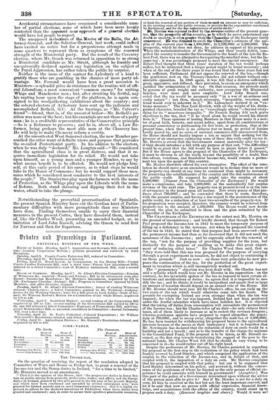Accidental circumstances have occasioned a considerable num- ber of partial
elections, some of which have been more keenly contested than the apfarent near approach of a general elects= would have led people to expect.
The unopposed reeleetions of the Master of the ROI; the At- torney-General, and the Solicitor-General, last week, could indeed have excited no notice but for a preposterous attempt made in some quarters to represent them as symptoms of the renewed strength of the Ministerial party. But the result of the Coventry election, where Mr. (leach was returned in opposition to so strong a Ministerial candidate as Mr. Strutt, although he frankly and unequivocally declared against any legislation on the subject of the Papal Aggression, has rather taken the public by surprise. Neither is the issue of the contest for Aylesbury of a kind to gratify those who are gambling in the chances of mere party ad- vantage. Mr. Ferrand would have been a great accession to Ministers—a splendid piece de resistance for the routine wit of offi.- dal Liberalism, a most convenient "common enemy" for uniting Whigs and Manchester men ; but, after strutting his fretful, nay his ranting hour upon the stage of the platform, he is again con- signed to his woolgathering exhibitions about the country ; and the sobered electors of Aylesbury have sent up the judicious and accomplished Bethell, Q.C. At the hustings, as "Mr. Calveres friend "—friend, that is, of the unseated briber—Mr. Bethell's po- sition was none of the best; but his essentials are not those of a party man ; he is a creditable representative of the Conservative principle —he is a Reformer to preserve ; and he is, above all, a Law Re- former, being perhaps the most able man at the Chancery bar. He will help to make Chancery reform a reality.
At the uncontested West Somerset election, the new Member per- sonified the utter want of definite views and purpose that pervades the so-called Protectionist party. In his address to the electors, when he was duly "declared," Mr. Langton said—" He considered that the agricultural class is in great distress, and that it re- quires immediate legislation for its relief. He would not take upon himself, as a young man and a younger Member, to say by what means benefit is to be effected. He would not pledge him- self, at this early period of his career, as to what steps he would take in the House of Commons ; but he would support those mea- sures which he considered most conducive to the best interests of the people." The Stanleyites play upon the farmers with the name of Protection, as the Whigs play upon the Liberals with the name of Reform. Both stand shivering and dipping their feet in the water, afraid to take the plunge.


























 Previous page
Previous page